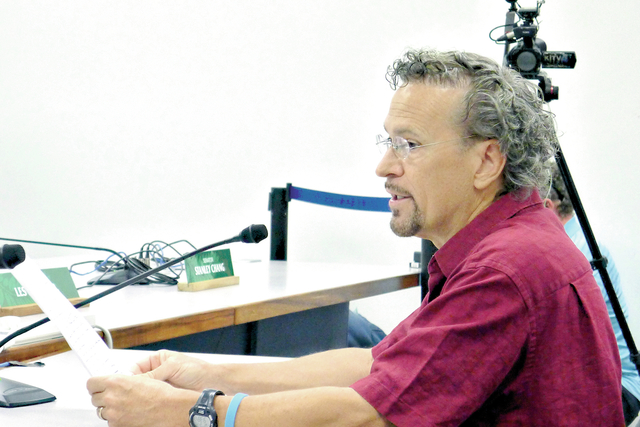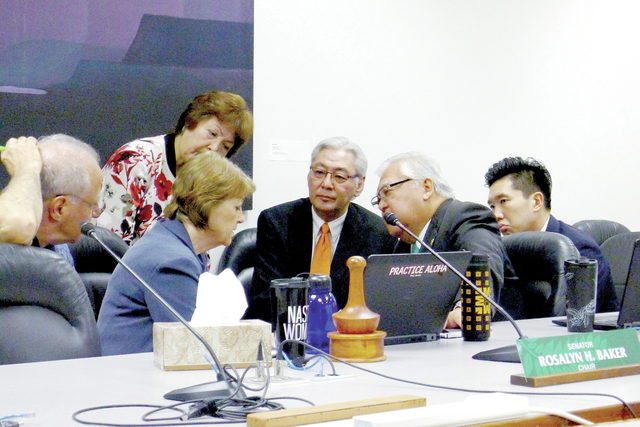‘The power to choose’: After impassioned testimony, ‘death with dignity’ bill advances in Senate
The state Senate Committee on Commerce, Consumer Protection and Health voted 6-0 Wednesday to recommend passing a “death with dignity” bill after testimony poured in during an emotional hearing Wednesday.
To become law, Senate Bill 1129 still must pass the full Senate and House and be signed by Gov. David Ige. It has overwhelming Senate support.
“I’ve always thought this was a choice I wanted for myself,” said Sen. Rosalyn Baker, D-Maui, the committee’s chairwoman. “I’ve seen too many of my friends with advanced stages in cancer waste away when they really wanted to be able to have that final control. I think choice in all areas is very, very important.”
House Majority Leader Scott Saiki, D-Oahu, says it has a 50-50 chance of passing in his chamber.
The bill would allow terminally ill patients to request life-ending medicine from a physician. They would have to be well enough to self-administer the drug. Proponents say it would let people avoid long-term, unbearable pain. Opponents say it would conflict with religious, moral and medical values.
Testimony was strong, opinions diverse and views deeply held.
“Supporters crowded the committee room at the state Capitol to urge lawmakers to pass the Hawaii Death with Dignity Act,” advocacy organization Compassion & Choices Hawaii told supporters after the hearing.
The Women’s Caucus of the Democratic Party of Hawaii favored SB 1129 in written testimony, saying, “anyone opposed to assisted dying simply need not ask. This bill would give patients with terminal illnesses the power to choose, not life over death, but one form of death over another.”
Hawaii Republican Party District Chairman Brett Kulbis, an opponent of the measure, wrote “life is a gift from God; every human life is sacred from conception to natural death.”
“If we pass assisted suicide it will turn affordable health care on its head by forcing us to endorse patient suicide, not patient care, as our public policy for dealing with pain and the financial burdens of care at the end of life,” he said.
Eva Andrade, president of the Hawaii Family Forum, said the bill “puts the poor, elderly, sick and disabled at risk for abuse.”
The bill does not “authorize a physician or any other person to end a patient’s life by lethal injection, mercy killing or active euthanasia.”
It says placing “undue influence on a patient to request medication for the purpose of ending the patient’s life” or trying to destroy a medicine request cancellation will be a Class A felony. Forging a request signature would, too.
The Hawaii Federation of Republican Women said people with depression “would be eligible to commit suicide under the provisions of this bill.” However, the bill requires an evaluation showing lack of impaired judgment or depression.
Hawaii Catholic Conference Executive Director Walter Yoshimitsu wrote that the bill could “blur longstanding medical, moral and legal distinctions between withdrawing extraordinary medical assistance and taking active steps to destroy human life” and undermine a physician’s healer role and pressure “vulnerable persons to end their lives.”
But Filipino-American Advocacy Network Chairwoman Amy Agbayani said, “I was born in the Philippines and raised as a Catholic. I feel that my religious beliefs are consistent with my support for this bill and I also believe in the separation of church and state.”
Lana Oura of Wailuku, Maui, said her dad, now deceased, asked the universe to “please take him and Mom, and, with tears in his eyes, he would also ask if I could help them die.”
They could refuse food or water, Oura said.
“They did not choose death by starvation and could not understand how taking a pill to end their life is considered a worse option than death by starvation,” she said.
Steve Lohse of Honolulu’s First Unitarian Church said end-of-life decision freedoms should exist, just like worship freedoms.
Beatrice Ramos Razon, president of Nursing Advocates & Mentors, said she and nurse colleagues have seen suffering in countless patients.
“We uphold the diverse religious beliefs/disbeliefs of all people, while at the same time respect that the personal decisions of end of life are a private matter, best left to the patient,” she said.
But the American Nurses Association said death with dignity is in “direct violation” of the Code of Ethics for Nurses, and “the ethical traditions and goals of the profession, and its covenant with society.”
Physicians would not be compelled to write prescriptions. Rather, only those willing to do so would participate.
Mary Steiner of Compassion & Choices testified 80 percent of Hawaii residents surveyed support such legislation.
“The Hawaii Medical Association has switched its long-standing opposition to medical aid in dying, recently adopting a neutral stance,” she said.
In the past, it was a strong opponent.
The Hawaii American Civil Liberties Union requested the term “death with dignity” be removed and replaced with “physician-assisted death” or “medical aid in dying.”
The Hawaii Board of Nursing took no stance. But it asked, if the bill progresses, advanced-practice registered nurses be added as potential “counselors” along with psychiatrists and psychologists.
Michael Golojuch Jr., chairman of the Democratic Party Lesbian Gay Bisexual Transgender Caucus, said “some have resorted to shooting or hanging themselves — one person’s aunty hung herself from the garden gate — leaving family members devastated and traumatized at their inability to help a member of their own ohana to pass peacefully, surrounded by loved ones.”
Golojuch wrote “terminal sedation” is used in which narcotic doses increase until the person loses unawareness.
Current practice, he said, is the “principle of double effect” which is used by physicians to “justify the administration of potentially life-ending doses of medication if their main intent is to end suffering — even if they know the medication will cause death.”
Dr. Andrew Kayes opposed the bill and supports hospice, with people made as comfortable as possible “by whatever means necessary.”
“Any medication for comfort, even if it hastens death, is reasonable,” he said. “This is called the principle of the double effect. And that is OK. We can already do this as physicians.”
But, Kayes said, “having a physician prescribe a drug specifically for the purpose of death is against the Hippocratic oath, is wrong and should not be supported by our state.”
The Hawaii Democratic Party said its platform favors death with dignity legislation. The party said California, Colorado and Washington, D.C., passed similar laws in the past year, tripling the number of terminally ill Americans that have access. Oregon, Vermont and Washington also passed similar laws. Montana’s Supreme Court ruled its state’s laws do not forbid the drug.
The Associated Press contributed to this article.
Email Jeff Hansel at jhansel@hawaiitribune-herald.com.




